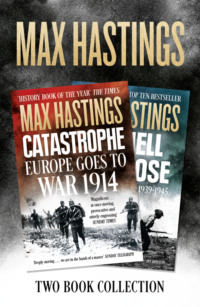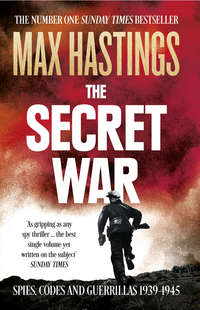
Полная версия
Did You Really Shoot the Television?: A Family Fable
Lewis was inevitably chief. All the children grew tall, the boys over six feet, except Basil who stopped at five feet seven. They developed a ruse for raising cash. Sometimes the older children were allowed to take the younger ones for a short walk without Nurse. They would station themselves outside a sweetshop then, at the sight of a benign-looking old gentleman or lady, overturn the pram containing baby Muriel Magdalen. The ensuing shrieks usually prompted the passerby to still the clamour by proffering a penny, immediately appropriated by the baby’s siblings to buy sweets.
In times of penury, they sometimes purloined their father’s books, ‘mostly trash about science and philosophy and so on, that he could hardly miss’, and sold them at a curiosity shop not far from the house. They christened the old dealer ‘Tuppence-the-Most’, because that was the largest sum he offered for anything. By degrees, most of the contents of the Hastings attic ended up in the shop of ‘Tuppence-the-Most’. The boys always wondered what the neighbours thought of the sight of them crawling round the roof leads, laden with goods. Nobody ever said anything, however. When in funds, they hired a bicycle from the old dealer for sixpence an hour. Six of them would take it in turns to try to master it, taking ten minutes apiece. Most of the boys’ money, however, went to the turnstiles at The Oval, a few minutes’ walk away. Passionate cricket fans all, devoted to the fortunes of Surrey, day after day they watched play from first ball to last. When his offspring were small, Edward Hastings subjected them to an hour’s lessons each day before he left for the office – Latin, Greek, Roman history and maths. Homework was set for the rest of the day, while Lizzie Hastings taught handwriting, history and geography. As the children grew older, tutors visited twice a week, including a bearded Frenchman who smelt of snuff, instructed them in his language, and prompted disgust by kissing them. Edward was too gentle a man to thrash his children, but Lizzie, in this as in most things a dour Scots biddy, applied the birch vigorously.
Their father liked to reward members of the Tribe for good behaviour or feats of prowess by inviting them to write down what presents they wanted, come their next birthdays. When Lewis was seven, on 8 March he wanted a whip; on 10 March, a box of tools and an alarm clock; on 7 June, implausibly, a bowl of flowers; on 13 June, a little pump; on 19 July, boxing gloves. When Ethel was eight, on 8 June she asked for handkerchiefs; four days later for a little pump. When Basil was five, on 13 June he bespoke a little pump; on the twenty-sixth a camp stool; on 19 July boxing gloves. The shared mania for ‘a little pump’ was prompted by a fascination with one which their father used for filling his bath, in the absence of taps. The children loved to work it, though when they grew up they puzzled in vain to remember why. ‘Needless to say,’ recalled Basil ruefully, ‘we never got any of the presents we asked for. All we got was money, which had to be put into the Savings Bank at once and dragged out afterwards to pay for broken windows.’
Yet another mystery of the family’s financial affairs is how Edward Hastings, on an annual income which rarely exceeded £400, contrived each autumn to take his enormous clan to the seaside for six weeks. The children adored the holidays, but dreaded the journeys. Edward, obsessive as ever, wrote down lists of every item of baggage, and insisted that each was ticked off as it was carried out to the railway omnibus, while the children stood in line, at attention in the hall. Besides the pram, camp stools and suchlike, a large table from Trinity Square was thought indispensable, because it was the only one at which Edward felt himself able to write in comfort. Each child was likewise ticked off the list, as the Tribe filed out of the house. In a characteristically quirky letter dispatched to Lewis, by then missing from the family party because he was at Hodder, Stonyhurst’s prep school, Edward rehearsed one such journey, in a fashion which suggested that he was a court reporter manqué:
Herm, 1.10.92
At 8.20am on Friday 23 Sept 1892 a (Victoria) omnibus with pair horses pulled up at 29 Trinity Square. In the hall there were
seventeen pieces of luggage as under. (1) cutter stand. (2) cutter (3) office bag (4) Elizabeth’s box (5) my wraps (6) CSSH grub box (7) mamma’s wraps (8) cradle (9) children’s box A (10) children’s Box B (11) hatbox (12) hamper (13) portmanteau C (14) portmanteau D (15) mamma’s tin box (16) children’s hat box (17) Margaret’s box.
The following persons were in the square looking on while the driver loaded the luggage: The Jacobs – the Smiths – the inhabitants of the Brockham Street corner house. Caroline Attwood the sister of Margaret Attwood came to see us and travelled with us to Waterloo. Mr Jarvis’s old woman was left in charge. I gave her a matchbox. Before the driver started Gladys and Beryl went on top of the omnibus. They saw the driver take a bottle. We were too quick for him.
Edward concluded with a brief inquisition, also characteristic:
(1) Have you been allowed to have your notebooks?
(2) What is the name of the archbishop who visited Hodder on 20 Sept? If you don’t know, find out.
(3) Furnish list of school books, stating a) name of book b) author c) edition d) date e) publisher
(4) Ask Father Graham the name of the Jesuit who drowned.
Herm, in the Channel Islands, was the family’s favourite destination. For several successive years, Edward rented a house on the island, the whole of which was the private property of a Prussian nobleman, Prince Blücher. Their holiday routine was as precisely regimented as everything else in their lives: 7 a.m., rise; 8 a.m., breakfast; 9 a.m., compile journals; 10 a.m., free time; 11.30 a.m., bathe; 1 p.m., lunch; 2.30 p.m., family walk; 5 p.m., tea; 5.30 p.m., evening prayers; 5.45 p.m., free time; 6.30 p.m., all children under seven go to bed; 8 p.m., supper; 8.30 p.m., retire to rest. The only part of each day which the children found intolerable was the requirement to compose a journal of its predecessor. Here is a typical entry of Lewis’s:
Bathed in the morning. Pater swam out five or six miles, perhaps, and a man said, ‘What is that man doing that for?’ It was Aubrey’s birthday. He got a pile of prayer-books from the pater and mater and somebody else gave him 2s 6d and a watch and chain, which broke while we were all winding it. Borrowed sixpence from Aubrey and went rowing with Basil. Dinner roast pork, beans, potatoes, stewed plums and rice pudding. Sardines for supper. Buns for tea. Yesterday the sky was an Italian blue. There was no wind. The sea was studied [sic] with boats of all kinds. There are some books in this house. Some of their names are God’s Glorious Creation, The Plant World, On Foot in Spain, John Halifax, Cresswell’s Maxima And Minima and Map And Plan Drawing, all rotten.
The children’s favourite companion on Herm was a fat, grizzled old sailor named Tom Duffy, who served as engineer of Prince Blücher’s private steam yacht. A man of infinite good nature, who had travelled the world as a seaman, Tom told them tales of Africa, the West Indies, Constantinople, Iceland. ‘It was so very much better than the stories in The Boy’s Own Paper,’ wrote Basil. The old salt took the children fishing for whiting and mackerel, and rigged their model boat. They spent hours standing at the door of his curious little cottage, in which he kept everything hung on the walls – even his prayer-book, attached to a piece of string. He said that it saved an old man the bother of reaching down. Tom, to the Pater’s gratification, was a good Catholic. When they saw him chewing tobacco, the boys tried it themselves. They were horribly sick, and were later soundly thrashed by the Mater. The aged sailor laughed heartily next day when he heard the story. He resumed his usual duty, answering the children’s incessant questions.
‘Ever been to Jersey, Tom?’
‘Rather.’
‘What’s it like?’
‘Jersey? Jersey’s a place for five-pound swells. A five-pound swell? That’s one of those young fellers cutting a dash on five pounds because that’s all he’s got.’
‘But you can do anything with five pounds, Tom.’
‘No you can’t, missie. It sounds a lot to you, but if you have to pay for your own lodgings and your own fares and your own food and your own amusements, it don’t last more than a fortnight. And then you’ve got nothing to show for it.’
Herm was full of fascinations for children. There were snakes, which the boys caught and sometimes tried to take home. They once caused consternation in the Customs shed at Southampton when the reptiles staged a mass escape. For some reason, Herm’s princely owner had elected to keep kangaroos, which roamed wild, and seemed untroubled by having stones thrown at them. No ordinary visitors were allowed on the island, so that it was a paradise for digging caves in the sands, playing pirates, hunting for treasure. ‘We were so happy that we couldn’t quarrel very much,’ wrote Basil. They also dreaded the prospect that a row might result in one of the Pater’s show trials, which would waste precious holiday time.
Each Sunday, the family boarded the proprietor’s glittering steam yacht to attend Mass on Guernsey. At sea, the boys watched Tom Duffy working the engine. If Prince Blücher himself was aboard, he passed the trip shooting seagulls. The children marvelled at their father’s almost inextinguishable holiday good temper. Edward seemed happier on Herm than at home, delighting in his children, perhaps because the Tribe was easier to manage amid the wide-open spaces. To Basil, each one of those September days in the Channel Isles was an idyll.
Back in London, during Victorian winters when there were annual freezes, the Pater taught his brood to skate on the Ladies’ Pond in Battersea Park. They never minded skating days, because lessons at home were cancelled. Indoors, most of the boys’ games involved model soldiers and bangs. In those days, gunpowder could be bought loose across the counter, like tea or sugar. It was regarded, even by Edward, as a perfectly normal playroom accessory. One day Lewis and Basil made a bomb by wrapping sixpence worth of black powder in an oily rag, placing it inside a tin and wooden fort, then laying a powder trail to the door of the nursery.
The Pater was summoned to join the children and witness the climactic moment. Blinds were drawn to make the room dark, then the fuse was lit. They watched enthralled as the flame raced across a desert made of silver sand and entered the fort, defended by broken lead soldiers, their uniforms glinting in the firelight. When the trail caught the oily rag, for an instant the fort became brilliantly lit. Then there was a thunderous crash as it blew apart. The watchers coughed and spluttered in a nursery full of smoke. The Mater ran upstairs and threw a fit when she observed a deep burn on the floorboards. She scolded Edward for allowing it all, as well she might. He, however, chuckled and chuckled, and was still laughing as he went downstairs. In his own life he had allowed himself so small a quotient of fun, of recklessness, of self-indulgence. A moment such as that one released all manner of unexpected emotions. At heart, the poor man may have yearned to unleash a wilder spirit than ever he allowed. In any event, the explosion provoked no recriminations for Lewis and Basil. Heredity must count for something, because an enthusiasm for bangs has been a persistent attribute of the Hastings family ever since.
The Tribe reserved its utmost scorn for visitors, who were received with almost unfailing discourtesy. A woman before whom they were paraded in the drawing room said to Lewis: ‘Well, you are a big boy! Do you know that I nursed you when you were a tiny baby in arms? You must give me a kiss.’ Lewis glared blankly back and demanded: ‘Are you going to give us any money?’ This caused her to become very red in the face and leave quickly. The children categorised visitors who offered no tips as ‘the paupers’. Young Claude cannot have been best pleased when old grandmother Mary Hastings died in 1885, and bequeathed him only her red rosary blessed by the Pope.
Children often recoil from the banality of grown-ups’ remarks. My grandfather winced when a woman visitor gushed: ‘And is this really Basil?’ The Mater, who had thrashed her offspring that very morning, assented with an indulgent smile, which increased her son’s disgust.
‘He is a very big boy – and he looks so healthy.’
‘Oh yes, but just a little bit troublesome at times, aren’t you, Basil?’ said the Mater, beaming.
‘Oh no, I’m sure not!’ said the visitor, lifting her veil as well as her glass of sherry, the better to inspect the youthful prodigy.
‘I am afraid so. He had to have a little whipping this morning.’
‘Well, there now, but he’s going to be a good boy always now, isn’t he?’
If these performances were repugnant enough, the children’s worst ordeals took place when parties were held at Trinity Square. Never much liking outsiders anyway, their resentment intensified when they were ordered to confine themselves to bread and butter, so that visitors could scoff the cakes and éclairs. After tea, the Tribe was required to sing for the assembled company, to their mother’s piano accompaniment. The worst of the ditties they performed was entitled ‘O Tea, O Tea, O Fragrant Tea’. Once, old General Hastings, Edward’s uncle who had spent most of his life in the US Army, arrived on a visit. He was very old and very deaf, supposedly in consequence of cannon-fire, and his wife shouted at him through a speaking trumpet. The children quite liked his stories of the Mexican expedition and the US Civil War, ‘but he was horribly ignorant about real history like Horatius and Castor & Pollux’. Their best visitor ever was a girl cousin, whose father gave her a sovereign with which to amuse herself and the Tribe. They were able to go to the Zoo and back in cabs, as well as gorge themselves on ten shillings’ worth of ices, mince pies, Banbury cakes, ginger beer, meringues, angel cake, chocolates and tangerines. Basil said: ‘It was the best feed we ever had.’
But that huge family was always happiest in its own company. Both Lewis and Basil became accomplished story-tellers, regaling the younger ones with tales of slave ships, pirates, treasure, ghosts. There were more than enough of them to perform plays and tableaux in the big kitchen, which had lots of doors. The nurse was conscripted to print a programme on Edward’s typewriter. ‘I don’t think the pater liked anything so much on earth as these plays,’ wrote Basil. ‘He was always frightfully solemn at the solemn parts, and roared like mad if there was anything comic. At the end he clapped and clapped till he was tired. If you wanted to cheer him up you only had to tell him that there was to be a play the next Saturday.’
Edward carried to extremes a refusal to display signs of alarm, less still panic. Once, two of the younger boys hired a steam engine from Tuppence-the-Most. After it had been running for some time, delighting the Tribe, their parents went to bed. Lewis and Basil set about discovering how fast the engine could be driven. They poured fuel into its furnace, even breaking up their siblings’ toy theatre to feed the flames. There was a thunderous explosion, smoke filled the house. The nurse woke, and hammered in terror at the Pater’s door. ‘Come out sir, come out!’ she cried. ‘The house is on fire!’ The Pater’s response caused the children to howl with laughter: ‘All in good time, Nurse, all in good time. Wait till I find the coat I usually wear on these occasions.’ When Edward emerged, however, he went out into the street and rang the fire alarm, causing the brigade to appear, its horse-drawn engines galloping up the street. The children were ecstatic, the Mater furious. She pointed out that the fire could have been extinguished with a few buckets of water. She was neither the first nor the last Hastings wife invited to endure much at the hands of her husband and offspring.
At ten, Lewis and Basil were sent to Hodder, Stonyhurst’s prep school. They proved successful schoolboys, both in the classrooms and on the sports field, winning prizes, Basil wrote later, without extravagant effort. Edward’s letters to his sons display the same relentlessly didactic spirit as do those of his own father Hugh to himself, a generation earlier. Because the boys had never known any other kind of father, and lived in an age and a family powerfully influenced by religion, they seem to have been untroubled by screeds which were, more often than not, exam papers.
‘My darling son Basil,’ Edward wrote from Herm on 10 October 1892,
I have your letter of 6 October. I notice you by mistake left the name of the archbishop blank. Please (1) supply the blank. Mamma has received the manual of Prayers for Youth, and I have got the list of books, for which I thank you. (2) please send the timetable. Please (3) answer question 34 more fully. I have told Gladys you thank her for her letter. (4) find out the derivation of the word ‘blandyke’. (5) what does ‘Night Studies’ in the Stonyhurst Calendar mean? (6) have you got Ethel’s umbrella? (7) have they any rules at Hodder, and can you send me a copy of them.
There followed an extract from Gladys’s journal of their Channel Islands holiday, then further bullet points, culminating with:
(17) I regret to hear of the drowning of the Jesuit you mention…By the bye – don’t call us your parents, but ‘my dear pater and mater’. It is a point of the utmost significance that when you leave Stonyhurst you should enter the world well apprised of its dangers and infinitely on your guard against bad company and the love of vanities and pleasures. You cannot fortify yourself too much against these evils. You must bring along with you all your religion. I wish you to pray to God to know your vocation.
The barrage of questions was punctuated with fragments of whimsy: ‘Have you asked for Lumley’s Select Plays Of Shakespeare? – which you lost. Responde mihi. Have you found Smith’s Latin Grammar?, respondez s’il vous plaît. I thank you for the programme of the concert of the 1st of November 1892 which was not, as you allege, a Sunday, but a Tuesday – Please apologise.’
Soon after Basil was promoted from Hodder to the main school at Stonyhurst, on 15 February 1893, his father demanded:
Did you cry when you left Hodder?
Do you suck your thumb still?
Do you feel at home at Stonyhurst?
Do you like any of the boys?
Do the boys kick or ill-treat you?
Please answer all questions.
And a week later:
We were sorry to hear that you were spending your holidays in the Infirmary. Did you offer up the sickness to God ‘all for thee, Oh my God – To do thy will, o God’. If you did not – you missed a grand opportunity of earning merit in the sight of God, for this sickness was a great disappointment to you – entailing as it did the loss of 15 days skating. Did you get any skating at all before you were taken ill? The 3rd term’s Report has come. You have attained only 13 marks in Religious Doctrine as against a possible 75 of marks attainable!!!
Edward’s obsession with recording trivia amuses his descendants, but suggests eccentricity of heroic proportions. In great-grandfather, pedantry tipped over into dottiness.
Basil’s Stonyhurst diary was as banal as most schoolboy records, as shown by this entry in 1894: ‘84 more days…Retreat began today. Association. I played right-wing and got two goals, 17 marks for my Greek theme. I have saved 9d. Xmas presents: Lewis got 2 pocket knives, a top hat, a purse; I got a pack of Snap cards, 2 coloured tops; sweets; a steerable balloon; parlour cricket; an artificial nose.’ More interesting was his catalogue of books read. First, there were those from the Spiritual Library: St Paul of the Cross, St Elizabeth of Hungary, The Little Flowers of St Francis. Then came works that he read for pleasure. He listed seventy-six titles, and many were exactly those tales of adventure which his own son, and later I, his grandson, in due course learned to love. G.A. Henty and Walter Scott figured prominently among favourite authors. Basil mentioned with special enthusiasm Bonnie Prince Charlie, Tales of Daring and Peril, The Talisman, St George for England, In the Dashing Days of Old, A Cornet of Horse, Stirring Stories by Land and Sea, Cutlass & Cudgel. A passion for books, and for historical romance, has persisted in the family. To give Edward his due, he did not allow his preoccupation with religion to deny the children fun.
More and more of his father’s letters to Basil included lines of congratulation on prizes won, runs and goals scored. But Edward could never abandon the habit of admonition, as in April 1894: ‘Your poem on Stonyhurst is disfigured by things attractive to the senses being given more prominence than things in which the mind plays a part.’ Nine months later, in January 1895, Edward was quoting Samuel Butler: ‘Nothing is more dangerous and nice and more difficult than for a man to speak much of himself without discovering a complacency in himself…and without discovering symptoms of secret self-love and pride.’ On 22 March, he advised Basil: ‘In your essay on the capture of Gibraltar you might bring in these saints as follows: “Not only did the capture of Gibraltar lead to the establishment of the Moorish dominion in Spain, but indirectly it may be said to have led to numberless martyrs sealing their fidelity with their blood. Had not Gibraltar been captured by the Moors it may be doubted whether saints like ss Nunilo and Alodia would have had the opportunity of winning their crowns.”’
As Lewis and Basil grew older, money matters intruded with increasing frequency into their father’s postal injunctions to them, as in this succinct note of 12 October 1896: ‘Dear Basil, please return enclosed bills with your observations. Don’t have any more neckties. Pater tuus S. Edward Hastings.’ Immense pains were taken to economise on their journeys to and from school. As an end of term approached, Edward dispatched a banknote to Basil with these lines: ‘3rd class railway ticket Whalley to S. Pancras 17-6; margin for contingencies 2-6. £1 supplied. Please give me a written account of how you spend it, and hand back to me the balance. Lewis omitted to write and acknowledge receipt of the £1.10s. This was a solecism on his part.’
Shillings mattered to the Hastingses.
Конец ознакомительного фрагмента.
Текст предоставлен ООО «ЛитРес».
Прочитайте эту книгу целиком, купив полную легальную версию на ЛитРес.
Безопасно оплатить книгу можно банковской картой Visa, MasterCard, Maestro, со счета мобильного телефона, с платежного терминала, в салоне МТС или Связной, через PayPal, WebMoney, Яндекс.Деньги, QIWI Кошелек, бонусными картами или другим удобным Вам способом.







